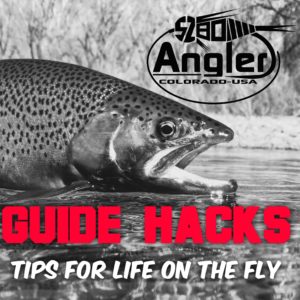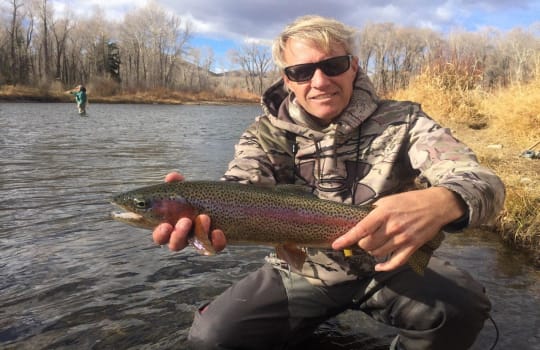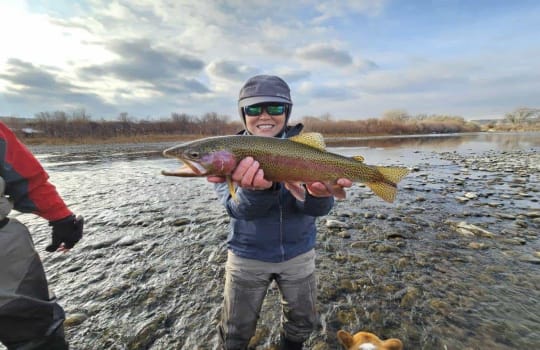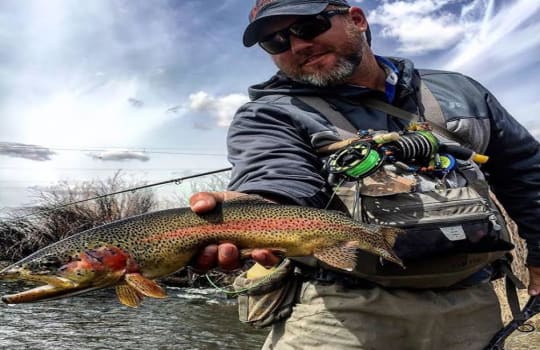5280 ANGLER GUIDE HACKS – Ron’s Rigs
GUIDE HACKS – Practical Strategies for Life on the Fly
Simple Methods for Building Effective Fly Fishing Rigs
by 5280 Guide, Ron Pecore
Guiding regularly on Colorado rivers for the last 12 years, I’ve come up with several simple and effective rigging methods that proven successful with my fly fishing guests of all experience levels. I’ll get right down to it, and explain some of the basics below. On a typical guided trip, I will be running 4 rods for two clients. One is set up for dry fly fishing, and three are built for nymph fishing.
Dry Fly Setup
My dry fly rod is a Sage 4wt. It has a supple Sharkwave line that casts like a dream. For example, I may have an “indicator” fly attached first in line at the end of my leader, followed by some small Trico, BWO, PMD, etc. depending upon the current hatch for the time of year. I use a 9ft. 4x nylon leader, to which I tie on my tippet of 5x from fly to dropper. The dry fly rig is not complicated, and likely one reason why so many anglers love to fish dries. However, the bread and butter of tailwater fishing lies in effective nymph strategies…
Nymph Fishing Setup
I run a very effective and simple nymph leader system that not only saves time but money as well.
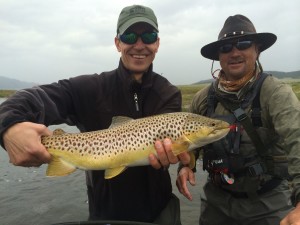
For nymph setups, I build my own leaders. I’ve found that if I use 10 lb Flourocarbon as the main leader, I save a ton of money and am virtually never in need of purchasing any nymph leaders. This simple formula works on any size river and on any size fish. Yes, I even use this method when chasing the monsters we pursue with guests at Boxwood and Long Meadow!
Here’s how I do it:
I start off by attaching 20 inches of 30lb nylon to my fly line. Most fly lines have a loop for a simple loop to loop connection. At the end of this butt section I tie another small perfection loop. This new connection point is where I now attach 8ft of 10lb Flourocarbon line. I use a basic clinch knot. At the end of the 10lb Flouro, I tie another perfection loop knot. Now I tie on my first tippet section (most often 3x, depending upon given flows and clarity) of approximately 20 inches, using another clinch knot.
On the 3x tippet I’ll either use a peg worm (topic for another blog), egg, rubberlegs, or other attractor pattern. From the bend in the hook I’ll tie my 2nd piece of tippet, approximately 16″ of (most often 4x flourocarbon) with a basic clinch knot. Onto this tippet section I will use something like a #18 pmd emerger or pheasant tail. Now I’m ready to add my 3rd and final fly.
I like to attach the 3rd tippet to the eye of the hook on the 2nd fly. I feel I catch more trout on the 2nd fly when do it this way. The third section is approximately 16 inches of 5x or 6x depending on clarity and size of trout we are expecting to catch. This knot, once again, is a basic clinch knot. The 3rd fly, as an example, might be a midge pattern or small Craven’s JuJu Baetis.
I attach split shot to the perfection loop above the first fly. This is 10 lb. material and there is less possibility of damaging the tippet. I also like to put a smaller piece of weight between the 1st and 2nd fly. This little trick has proved to be extremely successful in getting all 3 flies down in the water column.
Simple, Successful, and Cheap!
With this system you only need to know 2 knots..a perfection loop and a clinch knot. You’re entire leader is Flourocarbon, and yet is inexpensive. You can by a 200 yd, 10 lb spool for around 12 bucks, and this should last you several years!
Back to my three nymph rods now. Each one will be setup with different variations of the bugs I expect to see that day. Sooner or later, one setup will outshine the others. I will narrow the focus, adjusting the other rigs accordingly. Now, I realize that very few anglers will bring 4 of their own rods down to the water at once, as I have described. However, the setups are appropriate regardless of how many rods you use. Maybe the next time you hit the water with a buddy, try the multi-rod system as described together.
I’m all about keeping things simple and effective. In my next blog, I’ll show you a little variation to this type of rigging strategy and also explain my “peg worm system.”
Want some proof? The featured picture here is one of a client holding his first trout ever, caught on a chocolate worm pattern while fishing the Dream Stream! It turned out to be my favorite picture of the year.
Interested in learning more?
CONTACT US and we’ll schedule a guided fly fishing trip with 5280 Angler professional fly fishing guide, Ron Pecore.

